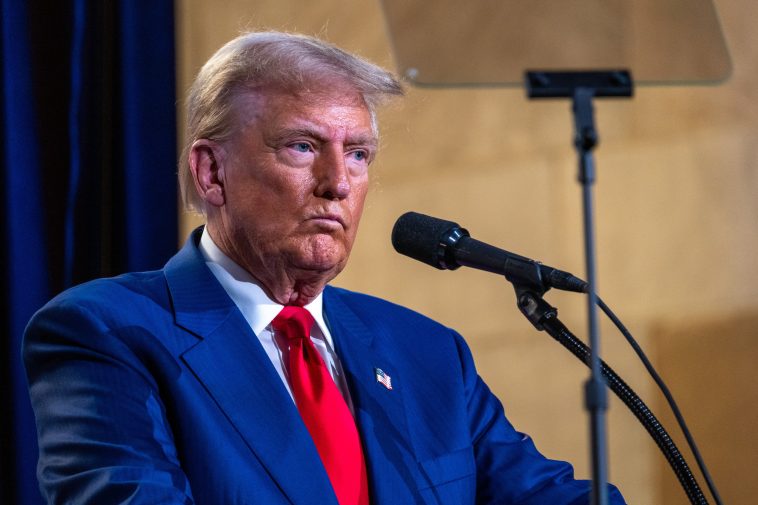Donald Trump on Monday threatened to impose 25% tariffs on goods from Mexico and Canada when he enters office next year—a move that would make good on a central campaign promise but that would likely crush American consumers who already say they’re struggling with the high cost of living.
Trump said he would sign an executive order on the first day of his presidency putting the tariffs in place, claiming that “thousands of people are pouring through Mexico and Canada, bringing crime and drugs at levels never seen before.” Trump posted on TruthSocial, “It is time for them to pay a very big price!” In a separate post, he also said he would charge an additional 10% on China unless the country implemented the death penalty for drug dealers: “Thank you for your attention to this matter,” he wrote.
The threat to America’s top trading partners—wielded through social media posts Monday evening—shook global markets and drew warnings that inflation could worsen, an issue, incidentally, that likely helped Trump defeat Kamala Harris in this month’s election. Trump allies downplayed those concerns: Bill Ackman, the hedge fund billionaire and vocal Trump supporter, suggested the tariffs wouldn’t actually be implemented and were a negotiating tactic for the president-elect to “effect foreign policy changes even before he takes office.” Elon Musk, a top adviser to Trump, echoed Ackman: “This will be highly effective,” he posted. Trump—who has said “tariff” is the “most beautiful word in the dictionary”—insisted during his campaign that “it’s not going to be a cost to [Americans].”
“It’s going to be a cost to another country,” Trump claimed at a Wisconsin rally in September.
But for all his populist rhetoric, the real cost of the president-elect’s economic policies will most likely be borne by Americans—particularly those in the middle and working classes, who are unlikely to enjoy the benefits of his tax cuts but who cast ballots for him out of frustration with the economy under President Joe Biden and Vice President Harris. Contrary to what Trump has said, American companies would pay the tariffs—costs they would pass along to customers. “We never want to raise prices,” Walmart CFO John David Rainey told CNBC last week. “Our model is everyday low prices. But there probably will be cases where prices will go up for consumers” if Trump’s tariffs take effect.
Trump, of course, is no stranger to bluster and empty threats, and Scott Bessent, his Treasury pick, has said that he would “recommend that tariffs be layered in gradually.” But if the selection last week of Bessent, a more conventional pick for the role, was taken as a “relief” by business leaders, Trump’s tariff announcement was a reminder of who’s actually calling the shots. As the economist Mohit Kumar wrote in a note Tuesday, as reported in DealBook: “Waking up to check the tweets for any policy announcements could become the norm.”
Cormac McCarthy’s Secret Muse Breaks Her Silence After Half a Century
We Need to Cover Donald Trump Differently This Time





GIPHY App Key not set. Please check settings